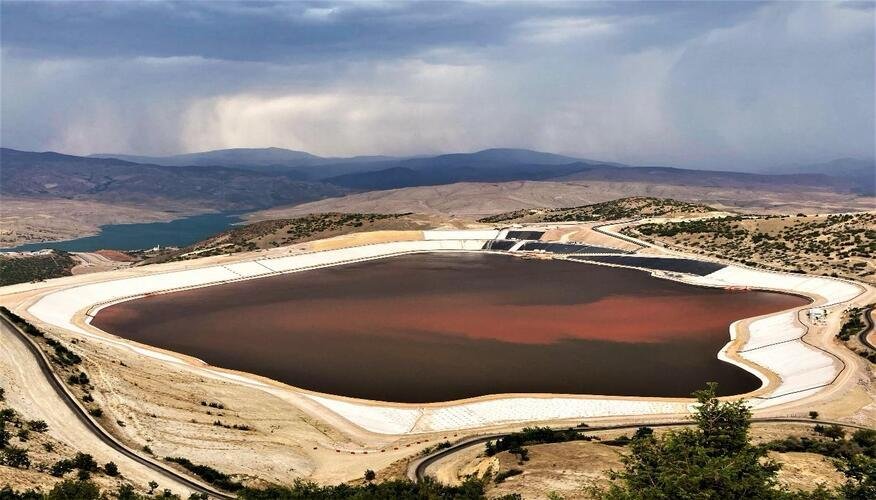A landslide at the Çöpler Gold Mine in the İliç district of Erzincan has buried workers and shed light on the scandals in the mine’s history, whose production capacity was increased twice despite warnings by experts.
The mine had previously been declared safe from landslide in its environmental impact assessments. This happened during the tenure of Murat Kurum as minister of environment, urbanization and climate change.
Kurum, who has also come under criticism for his share of responsibility in the high death toll of major earthquakes that struck southern Turkey in 2023 and killed more than 50,000, is currently running for İstanbul mayor as the candidate of the ruling Justice and Development Party (AKP).
In June 2022 a cyanide-bearing pipe in the mine burst and flowed into the İliç River. Despite this, the mine resumed operations three months later without its license being revoked. According to a report by the T24 news website, the government also forgave $7.2 million in taxes owed by Anagold, the company that operates the mine.
Erzincan Governor Hamza Aydoğdu confirmed that workers were trapped in the landslide, while İliç district Republican People’s Party (CHP) Chairman Mesut Güz claimed that 10 to 15 workers may have died, according to families. Justice Minister Yılmaz Tunç announced that four prosecutors had been assigned to an investigation into the incident, while Interior Minister Ali Yerlikaya said nine workers remained under the mud.
The gold mine, the second largest in Turkey and located on the active Bingöl-Yedisu fault line, has been accused of emitting cyanide and sulfuric acid for years, destroying the environment.
After the project’s positive environmental impact assessment (EIA) in 2008, its production capacity was increased twice after new EIA reports in 2014 and 2021.
The EIA reports stated that there was no landslide risk in the area, a claim that was disproved by the recent disaster.
Despite legal challenges to the EIA reports, the courts have ruled in favor of the mine’s continued operation.
The Turkish Bar Association (TBB) expressed concern over the disaster in a statement on Wednesday, criticizing the approval of the EIA by the Ministry of Environment and Urbanization for the mine expansion and a flotation plant project, pointing to the location of the mine near the Euphrates River, one of Turkey’s largest.
The TBB highlighted their earlier warnings and legal action, including a lawsuit to overturn the positive EIA decision and a criminal complaint following the rupture of the cyanide pipeline in June 2022.
In June 2023 the 6th Chamber of the Council of State called for a new expert investigation into an appeal by the Turkish Union of Engineers and Architects Chambers (TMMOB) since it had described the previous investigation by the district court as “inadequate.”
In a protracted legal battle that went all the way to the Constitutional Court, Eşref Demir filed a lawsuit against the environmental and safety practices of Anagold’s Çöpler gold mine.
Demir, a local resident near the mine site, filed a lawsuit in August 2018 against the ministry’s approval of the capacity expansion of the mine complex and requested that its operations be halted.
Demir’s lawsuit argued that the environmental impacts of the project were not thoroughly assessed, especially with regard to pastureland, drilling, blasting and activities that were carried out without the required permits and negatively affect agriculture and livestock, contaminate surface water and pose risks to human health and the ecosystem through the use of chemicals.
The court dismissed Demir’s claim on the basis of an expert report.
This decision was later upheld by the Council of State, although there were dissenting opinions emphasizing that the panel of experts lacked agricultural expertise and that further research was needed on the project’s impact on agriculture and livestock.
After the judiciary rejected his concerns, Demir appealed to the Constitutional Court, claiming that his rights to a fair trial, to life and to respect for private and family life had been violated due to the environmental impact of the project. The Constitutional Court found that there was a lack of agricultural expertise in the assessment of the project’s impact and criticized the superficial assessment of the project’s impact on livestock and agriculture. It concluded that the authorities had not carefully weighed the public and individual interests and had therefore failed to meet their obligations.
Despite critics highlighting the government’s responsibility in the disaster, so far only four people have been detained, low-ranking executives of the mining operation.
Work accidents are common in Turkey, where economic development can ride roughshod over safety concerns, particularly in the construction and mining industries. The country has recorded 1,898 mining fatalities since the AKP came to power in November 2002, according to data from the Health and Safety Labor Watch (İSİG).
Many blame Turkish President Recep Tayyip Erdoğan’s AKP for prioritizing economic interests and favoring pro-government mining companies, often at the expense of important natural habitats.

